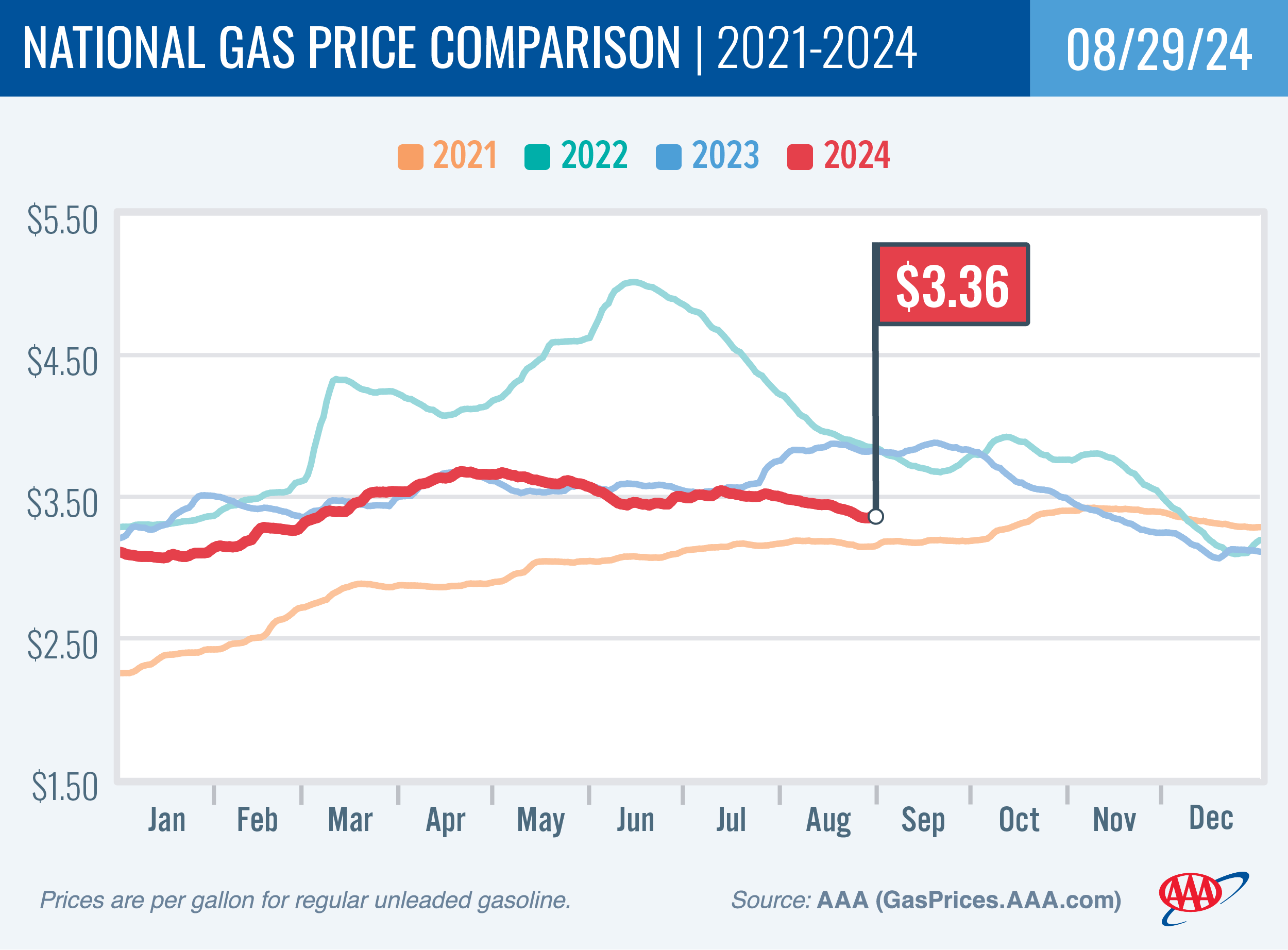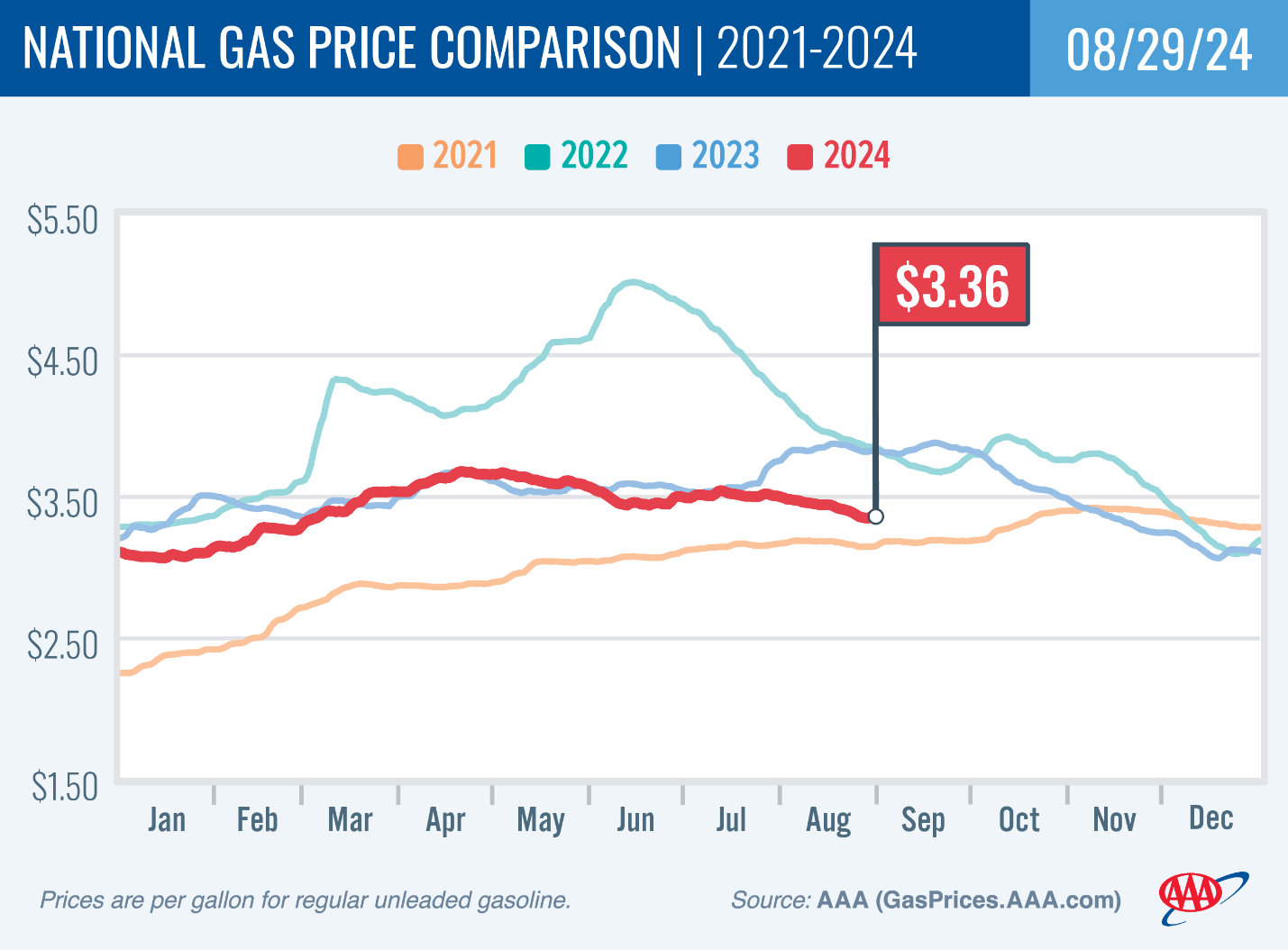Pace of Gas Price Decline Slows as Labor Day Weekend Arrives
Pace of Gas Price Decline Slows as Labor Day Weekend Arrives

Pump prices are still falling, but at a slower pace than recently, dipping just two cents to $3.36 since last week. A slight uptick in gas demand may reflect the last hurrah for summer travelers. A storm system forming in the Atlantic may threaten falling gas prices too. Meanwhile, the national average for L2 commercial electricity did not budge.
“Since today, 8/29, is my birthday, my wish is that this potential tropical storm fizzles quickly,” said Andrew Gross, AAA spokesperson. “And the arrival of September means cheaper winter-blend gasoline is almost here, which always helps take pressure off pump prices.”
With an estimated 1.2 million AAA members living in households with one or more electric vehicles, AAA lists the kilowatt-per-hour cost for Level 2 (L2) commercial charging by state.
Today's national average for a kilowatt of electricity at an L2 commercial charging station is 34 cents.
According to new data from the Energy Information Administration (EIA), gas demand rose last week from 9.19 million b/d to 9.30. Meanwhile, total domestic gasoline stocks fell from 220.2 to 218.4 million barrels, and gasoline production decreased last week, averaging 9.6 million daily. Unspectacular gasoline demand and falling oil costs may cause pump prices to slide further.
Today’s national average for a gallon of gas is $3.36, 14 cents less than a month ago and 46 cents less than a year ago.

Oil Market Dynamics
At the close of Wednesday’s formal trading session, WTI fell by $1.01 to settle at $74.52 a barrel. The EIA reports that crude oil inventories decreased by 0.8 million barrels from the previous week. At 425.2 million barrels, U.S. crude oil inventories are about 4% below the five-year average for this time of year.
Quick Gas and Electricity Stats
Gas
The nation's top 10 most expensive gasoline markets are Hawaii ($4.65), California ($4.62), Washington ($4.16), Nevada ($3.96), Oregon ($3.79), Alaska ($3.73), Illinois ($3.70), Washington, D.C. ($3.60), Idaho ($3.59), and Utah ($3.59)
The nation's top 10 least expensive gasoline markets are Mississippi ($2.88), Oklahoma ($2.94), Texas ($2.94), Tennessee ($2.95), Louisiana ($2.96), Alabama ($2.96), Arkansas ($3.00), South Carolina ($3.01), Missouri ($3.04), and Kansas ($3.05).
Electric
The nation’s top 10 least expensive states for L2 commercial charging per kilowatt hour are Kansas (22 cents), Missouri (24 cents), Delaware (25 cents), Texas (28 cents), Nebraska (29 cents), Utah (29 cents), Wisconsin (29 cents,) Michigan (30 cents), Vermont (30 cents) and North Dakota (30 cents).
The nation’s top 10 most expensive states for L2 commercial charging per kilowatt hour are Hawaii (56 cents), West Virginia (45 cents), South Dakota (43 cents), Arkansas (42 cents), Idaho (42 cents), South Carolina (42 cents), Montana (41 cents), Kentucky (41 cents), New Hampshire (41 cents) and Alaska (40 cents).
Drivers can find current gas and electric charging prices along their route using the AAA TripTik Travel planner.



